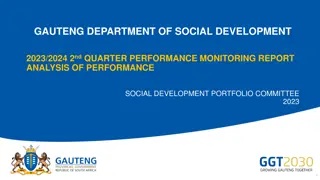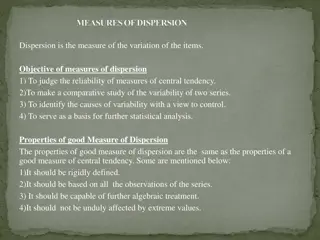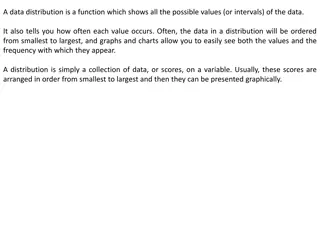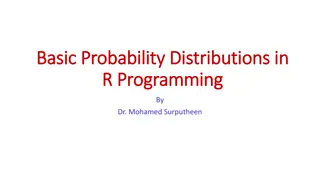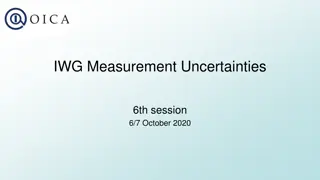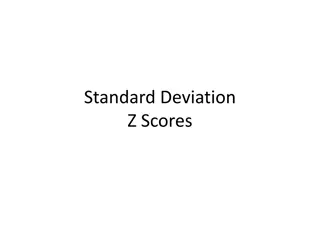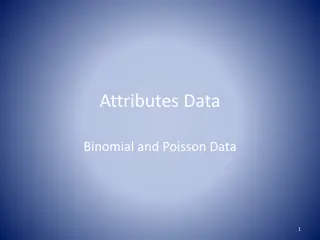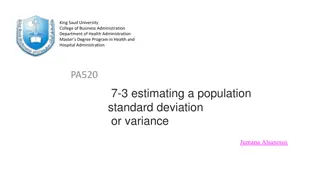Scenarios 2024 Modelling Methodologies
Explore the cutting-edge methodologies and tools implemented in the TYNDP 2024 Scenarios to enhance energy system representation and sector integration. Innovations include hydrogen modeling, heat and EV modeling improvements, offshore wind hubs, and deviation scenarios to meet EU targets.
1 views • 41 slides
Understanding 95% Confidence Intervals in Statistics
Confidence intervals are a key concept in statistics that provide a range within which the true value of an estimate is likely to fall. This video series explores the interpretation of 95% CIs, compares them to standard error and standard deviation, and explains how sample size and standard deviatio
2 views • 8 slides
Medical Center Health System.
The Medical Center Health System (MCHS) emphasizes the importance of reporting patient safety events to improve the quality and safety of patient care. All team members are encouraged to report any deviation from routine care, events causing harm or potential harm, near misses, patient complaints, a
0 views • 4 slides
Understanding Magnetism: Properties, Forces, and Compass Deviation
Explore the fascinating world of magnetism encompassing magnetic materials, lines of force, induction, and the significance of blue/red poles. Delve into the complexities of Earth's magnetic field, compass errors, and the role of permanent and induced magnetism onboard ships. Discover the different
1 views • 18 slides
Understanding Market Risk and Risk Management Techniques
Market risk arises from adverse price movements in the market that can lead to financial losses for organizations. Techniques such as standard deviation, Value at Risk (VAR), and Stress Testing are used to measure and manage market risk effectively. VAR helps quantify potential losses and their like
7 views • 12 slides
Understanding Binomial Distribution in R Programming
Probability distributions play a crucial role in data analysis, and R programming provides built-in functions for handling various distributions. The binomial distribution, a discrete distribution describing the number of successes in a fixed number of trials, is commonly used in statistical analysi
14 views • 30 slides
Understanding Prism Terminology and Light Deviation
Prisms are optical devices that deviate light without changing its vergence. This module explores the various terminology associated with prisms, including Apex, Base, Refracting Angle, and Angle of Deviation. The passage of light through a prism follows Snell's Law, where the ray is deviated toward
4 views • 42 slides
Understanding Normal Distribution in Statistics Education
Lesson resources for teachers to teach students about analyzing and understanding normal distribution in statistics. Includes learning standards, agenda, presentation, vocabulary activities, and additional resources. Emphasizes using mean and standard deviation to fit data to a normal distribution,
10 views • 23 slides
Spring 2BL : Lecture 5
In Lecture 5 of the Spring 2BL course with Vivek Sharma, students will delve into probability distributions, confidence levels, and the visualization of data through histograms. The lecture covers topics like calculating the mean and standard deviation, understanding the uncertainty in measurements,
2 views • 28 slides
Pharmaceutical Quality Management Systems Market
Meticulous Research\u00ae\u2014a leading global market research company, published a research report titled, \u2018Pharmaceutical Quality Management Systems Market by Solution Type (Deviation, CAPA, Audit, Risk & Compliance, Inspection, Document, Change, Training Management), Deployment Mode (Cloud,
7 views • 3 slides
Challenges in Asset Valuation Using CAPM
Analysis of the Capital Asset Pricing Model (CAPM) for listed companies demonstrates significant discrepancies between the model's results and actual returns. Various factors contributing to this deviation are discussed, including the limitations of the model and potential modifications to enhance i
0 views • 21 slides
Gauteng Department of Social Development 2nd Quarter Performance Analysis 2023/2024
Analyzing the 2nd quarter performance monitoring report of the Gauteng Department of Social Development for 2023/2024 reveals insights into program performance, governance, financial status, and rating categories. The report delves into departmental overview, non-financial performance, and areas of
0 views • 70 slides
Pharmaceutical Quality Management Systems Industry Valued at $3.97 Billion by 20
\nMeticulous Research\u00ae\u2014a leading global market research company, published a research report titled, \n\u2018Pharmaceutical Quality Management Systems Market by Solution Type (Deviation, CAPA, Audit, Risk &\n Compliance, Inspection, Document, Change, Training Management), Deployment Mode (
1 views • 3 slides
Pharmaceutical Quality Management Systems
Meticulous Research\u00ae\u2014a leading global market research company, published a research report titled,\n \u2018Pharmaceutical Quality Management Systems Market by Solution Type (Deviation, CAPA, Audit, Risk\n & Compliance, Inspection, Document, Change, Training Management), Deployment Mode (Cl
0 views • 3 slides
Earth-GRAM Overview and Updates 2023
Earth-GRAM is a global reference atmospheric model providing monthly mean and standard deviation data for various atmospheric variables. It is used in engineering for dispersion simulations but is not a forecasting model. Updates to Earth-GRAM include the Modern Era Retrospective Analysis, a global
0 views • 19 slides
The Rise and Fall of King Solomon: Lessons in Character and Gifting
The narrative unfolds the story of King Solomon from his ascent to power and wisdom to his eventual downfall due to his deviation from God's teachings. It emphasizes the importance of character alongside giftedness and prompts reflection on how one should utilize their gifts in alignment with moral
0 views • 13 slides
Clinical Escalation: Building Effective Communication in Maternity Units
Exploring the importance of clinical escalation in maternity units, this session outlines the components and practices involved in identifying, communicating, and acting upon clinical concerns. It emphasizes recognizing deviation from normality, effective communication, and taking appropriate action
0 views • 27 slides
Determining Sample Size for Research Studies: Factors and Considerations
Sample size estimation in research is a crucial step that involves various factors such as effect size, population standard deviation, power of the experiment, and significance level. The effect size indicates the practical significance of research findings, with common measures like Cohen's d and P
1 views • 24 slides
Understanding Measures of Dispersion in Statistics
Measures of dispersion in statistics help in understanding the variability of data points. They are essential for assessing the reliability of central tendency measures, comparing data sets, identifying variability causes, and guiding further statistical analysis. The properties of a good measure of
0 views • 8 slides
Redistricting Process in Costa Mesa: Plan, Rules, and Goals
Costa Mesa's redistricting process includes steps such as informational sessions, community forums, public hearings, and map adoption. The process follows California's criteria for cities, federal laws, and traditional redistricting principles. Goals include maintaining equal population distribution
0 views • 20 slides
Understanding Portfolio Theory and CAPM in Corporate Finance
Exploring the Capital Asset Pricing Model (CAPM) and portfolio theory in corporate finance, this chapter covers topics such as expected returns with ex-ante probabilities, portfolio variability measures, asset diversification strategies, and portfolio returns calculation. Through formulas and exampl
0 views • 51 slides
Understanding Data Distribution and Normal Distribution
A data distribution represents values and frequencies in ordered data. The normal distribution is bell-shaped, symmetrical, and represents probabilities in a continuous manner. It's characterized by features like a single peak, symmetry around the mean, and standard deviation. The uniform distributi
1 views • 23 slides
Understanding Binomial Distribution in R Programming
Probability distributions play a crucial role in data analysis, with the binomial distribution being a key one in R. This distribution helps describe the number of successes in a fixed number of trials with two possible outcomes. Learn about the properties, probability computations, mean, variance,
3 views • 30 slides
IWG Measurement Uncertainties: Justification of Impact Quantities
Explore the justification of main impact quantities in IWG Measurement Uncertainties session held on 6th and 7th October 2020. The analysis includes factors such as deviation from centered driving, start of acceleration, speed variations, load variations, background noise, temperature effects on noi
3 views • 25 slides
Effective Protocol Deviation Management in Clinical Research
Understand the importance of handling protocol deviations in clinical trials to ensure patient safety, data integrity, and compliance with regulatory requirements. Explore SOPs, electronic systems, and best practices for managing deviations effectively. Learn about GCP requirements, DMC usefulness,
0 views • 22 slides
Understanding Standard Deviation, Variance, and Z-Scores
Explore the importance of variation in interpreting data distributions, learn how to calculate standard deviation, understand z-scores, and become familiar with Greek letters for mean and standard deviation. Discover the significance of standard deviation in statistical analysis and the difference b
1 views • 18 slides
Understanding Measures of Variability: Variance and Standard Deviation
This lesson covers the concepts of variance and standard deviation as measures of variability in a data set. It explains how deviations from the mean are used to calculate variance, and how standard deviation, as the square root of variance, measures the average distance from the mean. Degree of fre
1 views • 26 slides
Understanding Standard Deviation in National 5 Mathematics
Standard deviation measures the spread of data around the mean, indicating how close or far apart values are from the average. This concept is crucial in analyzing data variability and consistency, with lower values signifying data clustered around the mean and higher values indicating greater dispe
3 views • 12 slides
Understanding Binomial and Poisson Data Analysis
Discrete data, including Binomial and Poisson data, plays a crucial role in statistical analysis. This content explores the nature of discrete data, the concepts of Binomial and Poisson data, assumptions for Binomial distribution, mean, standard deviation, examples, and considerations for charting a
2 views • 31 slides
Technology Considerations for Remote and Virtual Hearings Implementation
This content discusses the technology considerations for implementing remote and virtual hearings in courtrooms. It covers aspects such as courtroom technology framework, technology considerations matrix, and AV devices placement and requirements. The framework includes acoustic treatments, audio/vi
0 views • 7 slides
Understanding Descriptive Statistics: Mean, Standard Deviation, and Variance
Explore the fundamentals of descriptive statistics focusing on mean, standard deviation, and variance. Dive into the importance of these measures in interpreting data patterns effectively, with practical examples like analyzing the average height of individuals and understanding central tendency met
1 views • 23 slides
Leveraging Census Data for Effective Redistricting Advocacy
Utilize challenged census data to strengthen your redistricting advocacy by considering alternative datasets, such as self-response rates and tribal enrollment figures. Understanding population disparities and deviation considerations is crucial for effective advocacy efforts. Presenting additional
1 views • 9 slides
Calculating Mean and Standard Deviation of Data Sets
Learn how to find the mean and standard deviation of a set of numbers using a calculator. Follow step-by-step instructions with accompanying images to understand the process. Additionally, an example is provided to calculate the mean and standard deviation of monthly salaries based on a frequency ta
1 views • 13 slides
Statistics: Understanding Variance and Standard Deviation
Understand the concepts of population variance, sample variance, and standard deviation. Learn how to calculate these measures for sample and grouped data, and their significance in analyzing data dispersion. Discover the differences between population and sample variance, and when to use each measu
0 views • 11 slides
Ambulatory, Pediatric, and Geriatric Surgical Considerations
This content discusses ambulatory, pediatric, and geriatric surgery considerations, outlining the differences in surgeries for different age groups. It covers aspects such as prime candidates for ambulatory surgery, procedures done in ambulatory surgical centers (ASCs), staffing considerations, and
0 views • 32 slides
The Significance of Deviation in Literature
Linguistic deviation in literature serves to disrupt the normal processes of communication, challenging readers with non-traditional expressions and interpretations. Writers use deviation to create unique aesthetic value in their works, prompting readers to delve deeper into unfamiliar compositions
0 views • 12 slides
Cryptocurrency Diversification for Portfolio Optimization
Exploring the suitability of cryptocurrencies for diversification using Modern Portfolio Theory. The study aims to determine optimal portfolio weights for cryptocurrencies, assess the stability of these weights over time, and provide insights on cross-country evidence. Key considerations include ris
0 views • 22 slides
Estimating Population Standard Deviation or Variance in Health Administration Programs
Overview of estimating population standard deviation or variance in health administration programs, including key concepts like point estimates and confidence intervals. Explains critical values of chi-square distribution and provides examples for better understanding.
0 views • 24 slides
Understanding Standard Deviation in AP Biology
Standard deviation is a crucial concept in biology that helps analyze variability and distribution of data. This summary provides insights into within-group and between-group variations, normal distribution, and steps to calculate standard deviation using examples and formulas.
0 views • 18 slides
Understanding Standard Deviation and Standard Error of the Means
Standard deviation measures the variability or spread of measurements in a data set, while standard error of the means quantifies the precision of the mean of a set of means from replicated experiments. Variability is indicated by the range of data values, with low standard deviation corresponding t
0 views • 7 slides











